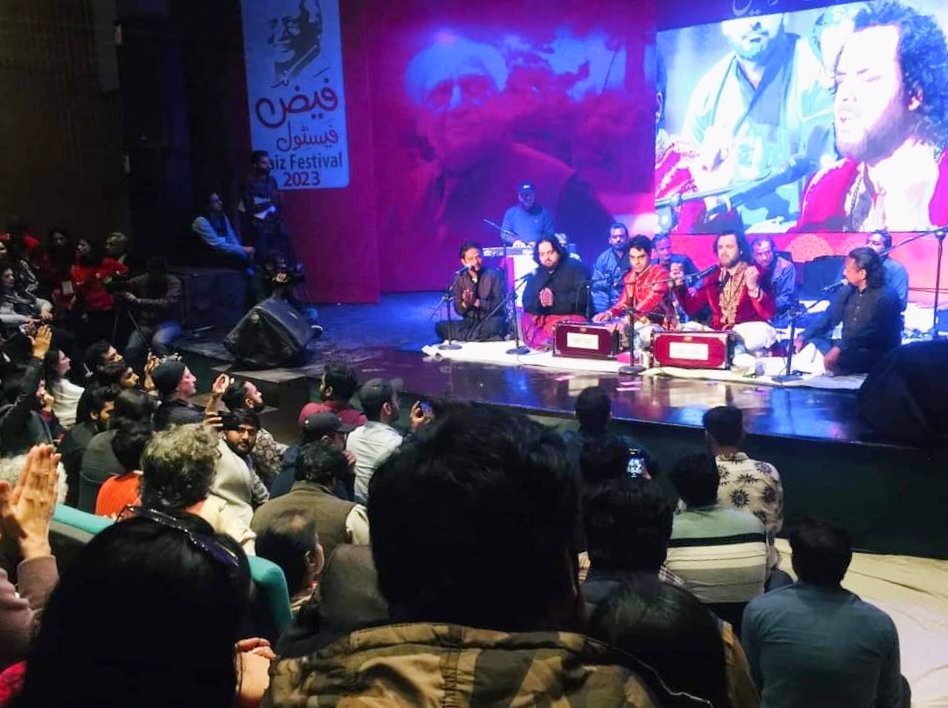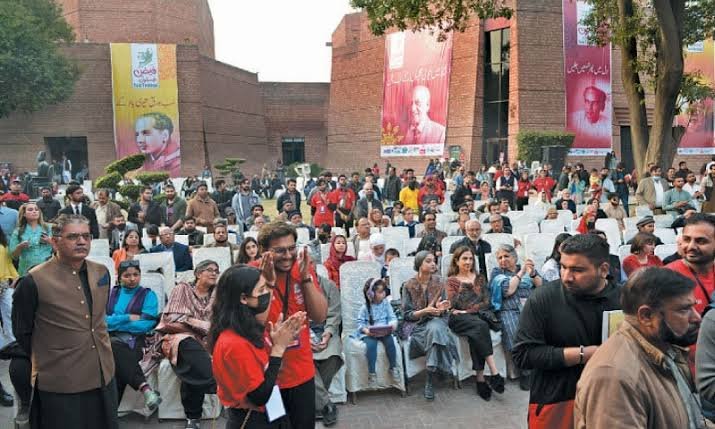The Faiz Foundation Pakistan hosted the 7th edition of the annual International Faiz Festival at the Alhamra Arts Council, Lahore in memory of renowned Urdu Poet, Faiz Ahmed Faiz. The festival took place from the 17th to the 19th of February.
It featured several literary, musical, and artistic events organized by Foreign Delegates from many nations, including India, the United Kingdom (UK), Canada, and the United States (US).
The venue hosted over 60 events, including debates, lectures, theatre, dance performances, qawwali, and mushaira.

The daughter of Faiz, Moneezah Hashmi, stated that they are maintaining the Faiz Festival to advance the vision and objective of Faiz Ahmed Faiz while adhering to tradition.
She continued that they are attempting to balance excellence and relevancy with the present issues with the performances.
Zia Moyheddin and Amjad Islam Amjad were remembered affectionately at the literary events for assistance during previous festivals.
Farah Yasmeen Shaikh, a Kathak dancer, visited the Faiz Mela. A group of UK-based Qawwals from the Sabri family performed their art at Alhamra.

Ajoka Theatre presented its famous play ‘Aanhi Mai Da Sufna’ during the ceremony. Numerous prominent local figures attended the discussion panels.
Some special mentions are Arfa Sayeda Zehra, Sarmad Sultan Khoosat, Poet Ali Mazhar, Fazal Jatt, Irfan Khoosat, Imran Abbas, and Sughra Sadaf.
History of Faiz Festival
The Faiz Mela or Festival is an annual cultural festival held in Lahore to honor the life and work of renowned Urdu poet Faiz Ahmed Faiz.
Every year, the celebration is observed around the birthday of Faiz Ahmed Faiz, who was born on February 13, 1911. The festival commemorates Faiz’s contributions to Urdu literature and social and political activism.
The festival began in 2015 and has become one of the country’s significant cultural events. It attracts international artists, musicians, writers, and intellectuals.
The Faiz Foundation Trust, founded in 1979 to promote Faiz’s work and literature heritage, organizes the event. Over the years, the Trust has conducted various events to promote Faiz’s poetry and his message of peace, love, and social justice.
Purpose of Festival
The Faiz Conference is noteworthy for its focus on international cultural interactions and cultural diplomacy. The festival allows artists from other nations to unite and present their work. Furthermore, it fosters intercultural dialogue and comprehension.

The Faiz Forum has served as a platform for Pakistani artists and cultural diplomats to exhibit Pakistani culture worldwide.
In recent years, Pakistan has continuously emphasized cultural diplomacy as it strives to create a positive picture of itself on the global scene.
The Faiz Summit contributes significantly to this endeavor by providing Pakistan’s literary heritage with a powerful platform to be shared with the rest of the world.
The literacy conference facilitates cross-cultural exchange by introducing a variety of activities. Artists and spectators from all walks of life mingle at Faiz Mela.
Also Read: Zia Mohyeddin: A Pioneer in Pakistan’s Performing Arts & Cultural Diplomacy
It also enables individuals to learn from one another by incorporating various cultural aspects. Furthermore, the festival allows cultural practitioners to collaborate and create new works.
In 2017, the Faiz Mela arranged a collaborative music project that brought artists from Pakistan and the US together to create unique compositions that mixed parts of Pak-US musical traditions.
These initiatives foster cross-cultural conversation and create new works that can be performed after the festival.

The Faiz Mela acknowledges not only the achievements of Faiz Ahmed Faiz but also the rich cultural history of Pakistan. The summit offers Pakistanis from all regions a chance to unite and celebrate their shared cultural heritage.
Cross-border Presentation
The Government of Pakistan has granted Javed Akhtar and other Indian cultural diplomats special visas for this ceremony.
Atul Tewari, a well-known Indian author, and actor joined the Faiz Celebrations. Tewari believes the poets Iqbal and Faiz are a joint legacy of the Indian subcontinent.

Javed Akhtar, a well-known Indian poet, joined the event. He also participated in a Mushaira during the festival and launched his most recent book.
Akhtar has attended the Faiz Mela in Lahore on multiple occasions. He has lauded the festival for its artistic and literary value.
Akhtar has acknowledged the significance of such a forum in fostering harmony and understanding between Pakistan and India, two nations that share a common cultural heritage.

Akhtar expressed his tribute to Faiz Ahmed Faiz and his work. He characterized Faiz as one of the best poets of the twentieth century, whose poetry is still relevant today.
Javed Akhtar also stressed safeguarding the literary heritage of poets like Faiz Ahmed Faiz, who used their poetry to raise public awareness of social and political issues. His work often reflects Faiz’s influence.
Akhtar’s admiration for Faiz Ahmed Faiz and his work exemplifies the importance of developing cross-cultural dialogue.
Faiz Festival- A symbol of cultural diplomacy
The Faiz Summit is a vital source of cultural diplomacy. It encourages dialogue across cultural boundaries. It has been stated that artistry exceeds all limitations.
A video of Indian poet Javed Akhtar jamming with Pakistani actor and singer Ali Zafar demonstrates this concept.
The video witnessed Javed having fun at the Alhumra Arts Council during the Faiz Mela while Zafar performs “Zindagi Aa Raha Hoon Main,” a superhit Bollywood song recorded by Kishore Kumar. Akhtar composed the theme for the 1984 movie Mashaal.

Promoting compassion, harmony, and peace in a connected world is essential. Faiz Festival contributes to bridging cultural gaps by presenting the vast diversity of Pakistani culture. It also provides platforms for international artists to cooperate and share their work.
*The views presented by the author do not reflect the position of The Diplomatic Insight. Nor does The Diplomatic Insight bear any responsibility for the accuracy of the information cited.
A student of International Relations interested in National Security strategies, with a good focus on Geo-Politics, Foreign Policy, and Public & Cultural Diplomacy.







